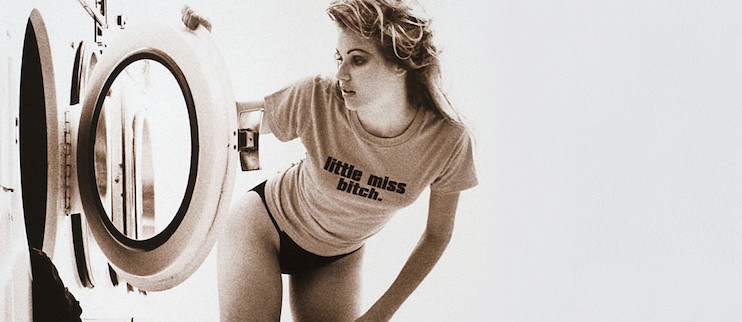Corrie, 17, was thrown out of her home and gets a job at a 24-hour laundry. The overnight shift comes with a very unique set of circumstances: On occasion, people come in at exactly 3 a.m. with a heavy load. She is told to turn off all lights and security cameras, call a special service number, and leave. She doesn’t know exactly what happens next, but she gets curious. And that curiosity turns out to be dangerous.

When Corrie finished high school, she didn’t celebrate – she just left. Now, like many, 20-year-olds, she lives a life with no real attachments beyond social media and her phone. She has one interest: art and vintage clothes but no motivation to push forward. She gets the perfect job working in a 24-hour cleaners: It requires no skill and minimal attention.
Jimmy, the owner of the Laundromat switches Corrie to the nightshift promising it will require even less of her attention. He wasn’t lying: the only thing she seems to ever have to do is fix the soap dispensers. Corrie finds the freedom of the nightshift almost enjoyable. Fewer people means less engagement. It’s not that she is a recluse; it’s just life is more vivid through her screen and sketching the locals. Time is hers.
On a typical nightshift, she sees her regulars, sketches, daydreams, and uses the equipment to entertain herself when boredom really strikes. Quickly, she settles into the pattern of her life. She doesn’t notice it becoming comfortable or friendly.
One day, Jimmy explains another part of her job. Occasionally, a ‘customer’ will drop off an oversized laundry load. When this happens, the instructions are very explicit: 1. She must flip a switch to cut the automatic security recording. 2. She must dial a number from the collection of calendars and fliers on the wall. 3. The ‘customer’ will put a box on the counter. She must put this box in the out-of-order dryer in the back. 4. She must leave – disappear – for three hours. Corrie grasps this process quickly. In fact, before disappearing, the ‘customer’ usually hands her a tip. She notices that upon her return the distinctly heavy load of laundry is always gone. There is no friendliness in the exchanges and minimal eye contact; it is all business.
While many might have questions or suspicions, Corrie comes from a generation passive to real-life events. The only rebellions they participate in can be done in comfort with a click. However, she does have one reaction. She names these customers: sometimes it’s Bob; sometimes it’s Harry; occasionally, it’s Suzie; sometimes it’s Bob 2. There are a lot of Bobs.
After months of Corrie’s comfortable routine, in comes one of her many Bobs. She readies for the routine, but this Bob drops dead. Then, from inside the bag, a voice asks: “Is he dead?” When she confirms that he indeed is, a naked young man, Jean-Jaques unzips himself and stands in the middle of the laundromat. He switches clothes with the dead man, stuffs him in the bag and tells her to just proceed as normal. Corrie knows regular wasn’t normal and this was definitely another level of not normal. Jean-Jaques gives her a number just in case – more not normal.
Nothing feels normal after that night. Corrie begins to feel fear creeping into her life and into her reactions. One night, Bob comes in with the bag. She goes to make the call before flipping the switch. This is the wrong order. Bob immediately goes for a gun on the inside of his coat. Corrie hears the gun and is flustered but calms herself enough to do things the right way. She puts the box in the back taking a peek this time. She is not shocked to see a block of money. She comes out and gets her coat to leave. Bob has a fake smile – he hands her a $100 bill and tells her to enjoy her break.
Corrie can’t return to normal again: she now gets a little nervous each time “Bob” comes in. He watches her more closely, and she is very uncomfortable. She wonders if they all carry guns. Then, she stops wondering; she knows the answer.
By the next oversized laundry drop, Corrie has convinced herself that she needs to get away, but she doesn’t have the means; no-one does the night shift in a laundromat by choice. She can think of only one way to escape: she could deal with the oversized laundry herself, take the money, and flee.
She makes a decision and sets forth with an uncharacteristic determination. When Bob comes in again, she goes through the ritual. After he leaves, we see she didn’t really call the number. Corrie drags the bag into the back and to the machine that says ‘Out Of Order.’ She finds chemicals, tools, and other intimidating materials. As she opens the laundry bag, she gasps at her reality.
She almost Googles how to dispose of a body, fluoroantimonic acid, or other chemical names she sees before her but realizes she shouldn’t; Google is a hand of the man tracing and tracking her every move. She wonders if there is a body-disposing App.
When she realizes that she probably cannot do this alone, she flashes back to the gun; the danger of what she is doing hits her like a brick. She needs help and makes a call that could save her or have her join the next load of “human laundry.” Either way, calling Jean-Jaques will determine the rest of her life. She dials.

